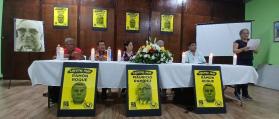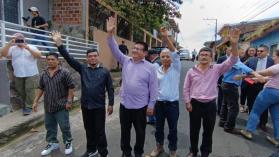CISPES Declaration on the 15th Anniversary of the 1992 Salvadoran Peace Accords
January 2007
As Salvadorans prepare to commemorate the 15thanniversary of the signing of the 1992 Peace Accords, the Committee inSolidarity with the People of El Salvador (CISPES) salutes theSalvadoran peoples history of struggle. Fifteen years ago, wecelebrated together with the FMLN and the people of El Salvador the endto the civil war and U.S. military intervention in the country. However, while the January 16th signing of the Chapultepeq PeaceAccords brought to a close the12-year armed conflict, they did notresolve the root causes of the war: prevalent social injustice,extremely unequal distribution of land and resources, and undemocraticand repressive state institutions. Fifteen years ago we believed,along with the Salvadoran people, that the mechanisms of the PeaceAccords as well as popular pressure would help resolve the most direneeds of the Salvadoran people. Sadly this has not been the case.
With the right-wing ARENA government in power, the Salvadoran peace process has repeatedly seen set backs. The imposition of CAFTA, along with the privatization of public services over the past fifteen years, has created an economic crisis that forces hundreds of Salvadorans to emigrate each day in search of economic survival. The government has failed to address the causes of social problems like crime and violence, and instead has fomented the violence that today plagues El Salvador.
Although the U.S. government suspended its massive military support to the Salvadoran right-wing when the war ended, Washington has continued to prop up successive ARENA governments through economic and political favors, not to mention direct intervention. This became especially apparent during the 2004 presidential elections when U.S. officials slandered the FMLN candidate and threatened reprisals should the Left win the elections.
Most recently, peace in El Salvador has been hampered by increased government repression, the criminalization of protest, and the lack of justice in politically motivated murders and crimes. The passage of legislation like the so-called "anti-terrorist" law attacks the right to organizing by labeling protest actions "terrorism." Furthermore, there have recently been a number of murders that show signs of being politically motivated, including the assassinations of Salvadoran American unionist Gilberto Soto in 2004, the elderly Manzanares family in 2006, as well as other community and local religious leaders. The government has been negligent in investigating or bringing justice to these cases, even after the Salvadoran Human Rights Office denounced resurgence of death squad-like groups in El Salvador.
Again, the U.S. government has been silent on this worrisome issue of basic human rights, instead backing the ARENA governments repressive anti-crime policies by opening the "International Law Enforcement Academy" (ILEA) last year. This school, funded by the U.S. and run jointly by the U.S. and Salvadoran governments will train police and judicial officials from throughout Latin America. However, with U.S. officials recently voicing support for ARENAs increasingly repressive anti-crime laws, and with little transparency around the content of ILEA trainings, this new Academy represents another form of implicit U.S. backing of state repression throughout the hemisphere.
It is for these reasons that CISPES reaffirms our solidarity with the FMLN and the Salvadoran social movement in their struggles to create an alternative for El Salvador based on principles of social and economic justice. On this important anniversary, we again commit to our continued work of educating and mobilizing people in the U.S. to change the course of U.S. foreign policy, working to stop the U.S.s imposition of free trade, militarism, and so-called "anti-terrorism." Therefore, we demand of the U.S. government a respect for the self-determination for the people of El Salvador and all nations. We celebrate the work of the FMLN and the social movement in constructing systems of popular power that will allow for the creation of a true, lasting peace based on social justice.

 "I am a CISPES supporter because continuing to fight for social justice and a more people-centered country means continuing the dream and sacrifice of thousands of my fellow Salvadorans who died for that vision.” - Padre Carlos, New York City
"I am a CISPES supporter because continuing to fight for social justice and a more people-centered country means continuing the dream and sacrifice of thousands of my fellow Salvadorans who died for that vision.” - Padre Carlos, New York City

